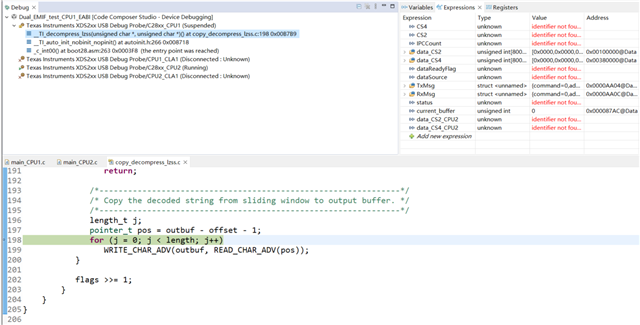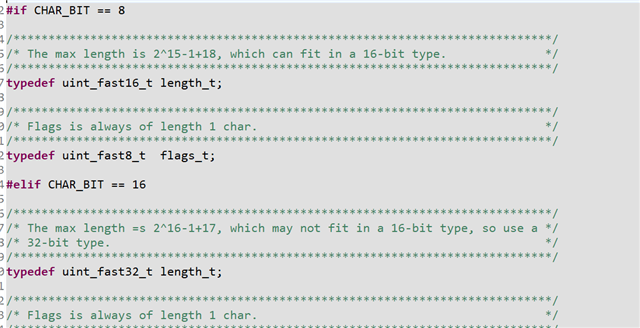如题所示,我是利用EMIF对SRAM进行写入,当我写入小于65536个数据就可以正常写入,超过65536个数据就不行,就会卡在图里面的for循环中,但是length的定义length_t是灰色的,又无法知道他是什么类型,我该怎么办呢?我怀疑就是length_t的长度不够,65536刚好就是16位,里面的CHAR_BIT怎么修改呢?
/*****************************************************************************/
/* copy_decompress_lzss.c */
/* */
/* Copyright (c) 2006 Texas Instruments Incorporated */
/* http://www.ti.com/ */
/* */
/* Redistribution and use in source and binary forms, with or without */
/* modification, are permitted provided that the following conditions */
/* are met: */
/* */
/* Redistributions of source code must retain the above copyright */
/* notice, this list of conditions and the following disclaimer. */
/* */
/* Redistributions in binary form must reproduce the above copyright */
/* notice, this list of conditions and the following disclaimer in */
/* the documentation and/or other materials provided with the */
/* distribution. */
/* */
/* Neither the name of Texas Instruments Incorporated nor the names */
/* of its contributors may be used to endorse or promote products */
/* derived from this software without specific prior written */
/* permission. */
/* */
/* THIS SOFTWARE IS PROVIDED BY THE COPYRIGHT HOLDERS AND CONTRIBUTORS */
/* "AS IS" AND ANY EXPRESS OR IMPLIED WARRANTIES, INCLUDING, BUT NOT */
/* LIMITED TO, THE IMPLIED WARRANTIES OF MERCHANTABILITY AND FITNESS FOR */
/* A PARTICULAR PURPOSE ARE DISCLAIMED. IN NO EVENT SHALL THE COPYRIGHT */
/* OWNER OR CONTRIBUTORS BE LIABLE FOR ANY DIRECT, INDIRECT, INCIDENTAL, */
/* SPECIAL, EXEMPLARY, OR CONSEQUENTIAL DAMAGES (INCLUDING, BUT NOT */
/* LIMITED TO, PROCUREMENT OF SUBSTITUTE GOODS OR SERVICES; LOSS OF USE, */
/* DATA, OR PROFITS; OR BUSINESS INTERRUPTION) HOWEVER CAUSED AND ON ANY */
/* THEORY OF LIABILITY, WHETHER IN CONTRACT, STRICT LIABILITY, OR TORT */
/* (INCLUDING NEGLIGENCE OR OTHERWISE) ARISING IN ANY WAY OUT OF THE USE */
/* OF THIS SOFTWARE, EVEN IF ADVISED OF THE POSSIBILITY OF SUCH DAMAGE. */
/* */
/* */
/* Decompress routine for Lempel-Ziv-Storer-Szymanski (LZSS) compression. */
/* Given an input buffer with data compressed using LZSS encoding and an */
/* output buffer, this routine decompresses the data in the output buffer. */
/* */
/* NOTE: */
/* 1. This routine could be used to copy uninitialized or initialized global */
/* data space of a program. Hence this routine cannot define any global */
/* variable. */
/* 2. This routine will never be used to initialize stack space and hence */
/* all the variables are allocated to stack. */
/* 3. The calling application should ensure the output buffer is big */
/* enough to hold the uncompressed data. */
/* */
/*****************************************************************************/
#include <stdint.h>
#include <limits.h>
#define LZSS_EOD 4095
#define LZSS_WINDOW_SIZE 4095
/*****************************************************************************/
/* The offset is always 12-bits so use a 16-bit type. */
/*****************************************************************************/
typedef uint_fast16_t offset_t;
#if CHAR_BIT == 8
/*****************************************************************************/
/* The max length is 2^15-1+18, which can fit in a 16-bit type. */
/*****************************************************************************/
typedef uint_fast16_t length_t;
/*****************************************************************************/
/* Flags is always of length 1 char. */
/*****************************************************************************/
typedef uint_fast8_t flags_t;
#elif CHAR_BIT == 16
/*****************************************************************************/
/* The max length =s 2^16-1+17, which may not fit in a 16-bit type, so use a */
/* 32-bit type. */
/*****************************************************************************/
typedef uint_fast32_t length_t;
/*****************************************************************************/
/* Flags is always of length 1 char. */
/*****************************************************************************/
typedef uint_fast16_t flags_t;
#else
#error Illegal value for CHAR_BIT
#endif
/*****************************************************************************/
/* MSP copy tables can handle moving functions even in small data model + */
/* large code model, where data pointers are not big enough to represent */
/* function pointers. This requires the EABI decompression functions */
/* (SHARED/copy_*.c) to be changed to accept "far" pointers. For this */
/* memory model combination, the decompression functions are changed to use */
/* "unsigned long" to represent function pointers, so function pointers */
/* through which we call these functions also needs to have a prototype */
/* accepting "unsigned long" instead of pointer types. All other memory */
/* model combinations use the same prototype that all the other targets use: */
/* two data pointer arguments. Ultimately we use MSP peek/poke intrinsics */
/* to read/write the "far" memory. */
/*****************************************************************************/
#if defined(__MSP430__) && defined(__LARGE_CODE_MODEL__) && !defined(__LARGE_DATA_MODEL__)
typedef unsigned long pointer_t;
typedef unsigned long pointer_to_const_t;
#define READ_CHAR_ADV(x) __data20_read_char(x++)
#define WRITE_CHAR_ADV(x, c) __data20_write_char(x++, c)
#else
typedef unsigned char *pointer_t;
typedef const unsigned char *pointer_to_const_t;
#define READ_CHAR_ADV(x) (*x++)
#define WRITE_CHAR_ADV(x,c) (*x++ = (c))
#endif
/*****************************************************************************/
/* */
/* __TI_DECOMPRESS_LZSS() - Decompress data encoded using LZSS encoding. */
/* Input buffer (inbuf) has the encoded data and */
/* uncompressed data is returned in outbuf. */
/* */
/*****************************************************************************/
__attribute__((section(".text:decompress:lzss")))
void __TI_decompress_lzss(pointer_to_const_t inbuf, pointer_t outbuf)
{
while (1)
{
flags_t flags = READ_CHAR_ADV(inbuf);
int i;
for (i=0; i<CHAR_BIT ; i++)
{
if (flags & 0x1)
{
/*---------------------------------------------------------------*/
/* We have an uncoded byte, just write it out. */
/*---------------------------------------------------------------*/
WRITE_CHAR_ADV(outbuf, READ_CHAR_ADV(inbuf));
}
else
{
/*---------------------------------------------------------------*/
/* Read and unpack the offset and length */
/*---------------------------------------------------------------*/
offset_t offset;
length_t length;
#if CHAR_BIT == 8
offset = READ_CHAR_ADV(inbuf);
length = READ_CHAR_ADV(inbuf);
offset <<= 4;
offset |= ((length & 0x00F0) >> 4);
length = (length & 0x000F) + 3;
/*---------------------------------------------------------------*/
/* If the length is 3->17, we only use 4 bits. If the length is */
/* >= 18, we read an additional 8 bits and add it to the length. */
/* */
/* If the msb of the second byte is 1, we read an additional */
/* 8 bits and use that for bits 7-14 of the length. This gives */
/* us a range of 3->32785. */
/*---------------------------------------------------------------*/
if (length == 18)
{
length_t length2 = READ_CHAR_ADV(inbuf);
if (length2 & 0x80)
{
length_t length3 = READ_CHAR_ADV(inbuf);
length2 = (length2 & 0x7f) | (length3 << 7);
}
length += length2;
}
#elif CHAR_BIT == 16
unsigned char temp = READ_CHAR_ADV(inbuf);
length = (temp & 0xf) + 2;
offset = temp >> 4;
/*---------------------------------------------------------------*/
/* If the length is the maximum value encoded in 4 bits, read an */
/* additional 16-bit value and add it to the length. */
/*---------------------------------------------------------------*/
if (length == 17)
length += READ_CHAR_ADV(inbuf);
#endif
/*---------------------------------------------------------------*/
/* If the offset indicates end of data, exit. */
/*---------------------------------------------------------------*/
if (offset == LZSS_EOD)
return;
/*---------------------------------------------------------------*/
/* Copy the decoded string from sliding window to output buffer. */
/*---------------------------------------------------------------*/
length_t j;
pointer_t pos = outbuf - offset - 1;
for (j = 0; j < length; j++)
WRITE_CHAR_ADV(outbuf, READ_CHAR_ADV(pos));
}
flags >>= 1;
}
}
}

